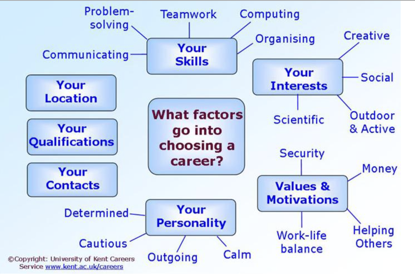How to choose a career?
The first thing to realise about choosing a career is that this is not some major life commitment to pursue in just one area or one company. The world of work in the 21st century is dynamic, and no longer expect graduates spend their working lifetime with a single employer pursuing a single career path. There are plenty of opportunities to change as you begin to realise where you want to focus and where opportunities lie.
Most students at University have little idea of what they want to do, which company to join or where they want to be in 20 years’ time. The key concept that you need to think about here is `optionality’. If you are not sure, look for a less specialised degree that provides you with a pathway to explore. In this way, you have a broader and a more general view and keep your options open.
For instance, you may want to get into business but have no idea what area of business, then, for example, doing accountancy and qualifying with a professional qualification will open up new business career options for you. Business opportunities are fluid; shifting professions is easy. Long term career planning is discouraged as the world of business is disruptive. Industries, companies and occupations that seem to be top today might not be tomorrow. A whole new world of work is emerging, in which the old structures are quickly destroyed, and new ones appear.
Old rules don’t apply. In a fast-changing job market, adaptability – i.e. not having a specific goal in mind and being flexible – works in your favour. Think about the direction of travel rather than a definite destination. Think also what will be big in 20 years time and not necessarily big today. If you are part of a small minority, fathom exactly where your interests are, know which company you want to work for or which career you want to pursue, go ahead and focus on it and live the dream. Otherwise, stay flexible, opportunistic and do things that increase your options in the future and not reduce them.
The most important task is for you is to leave university with an elite graduate job offer. Your CV will glitter if you have a cream placement in a multinational corporation for the first few years after leaving University. Such elite companies will show you a multitude of opportunities that you did not even know existed. This will inspire you in the future and help you decide later, where you wish to focus and build a career. One important guideline, the smaller the company, the less the opportunity, as small businesses need to be centred on doing a few things well. Multinational corporations broaden the exposure to many different areas of business.
The second thing is to think big and bold. Refrain from pessimistic thinking.Whatever University you went to, whatever your background is, whatever degree you did, there are fantastic elite graduate roles for you. The biggest barrier that will prevent you from considering applying to these elite graduate jobs is your mindset.
The first step is planning for your future. Ponder upon the following:
- What are your strengths?
- What are your passions, motivations, interests & values?
- What have you enjoyed doing at university?
- Research? Social activity?
- What kind of lifestyle do you want?
- Which careers captivate your imagination?
Think about if you have some of these attributes. Your friends may have probably given you this feedback, or you might have some self-awareness of what you are good at. Let’s look at a few sample scenarios:
“Having the gift of the gab”: A talent required of sales and marketing roles.
“Being a shoulder to cry on”: Many HR figures need this aptitude.
‘Extremely detailed and analytical’: Commercial posts from Investment banking to accountancy must have this competency.
“My dogged determination’: IT and broad industrial jobs are obligated to have this trait.
“Haggling and bargain-hunting”: Any trading role from oil business to banking.
“Want to know everybody”: Sales and HR roles benefit from this.
“Being super-organised”: Many IT and broad business positions will find this useful.
‘Like being very technical’: You may like R&D roles.
“Want to make loads of money”: Big commercial roles in global organisations.
“Happy to work long hours”: Global banking could be for you.
Concerning the skills graduate, employers are looking for -An excellent academic record will not compensate for a weak skill set as executives expect today’s graduates to apply themselves in real world situations instead of being book smart. Being self-aware is important. Always observe the kind of dexterity you develop through work experience, volunteering or part-time, casual work.

Leave a Reply